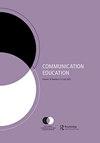You have to name the problem to fix it: White supremacy in Communication Education
IF 0.8
Q3 COMMUNICATION
引用次数: 3
Abstract
I was a graduate student at a time when Communication Education was still actively and aggressively hostile to any form of critical scholarship about race. I vividly remember the 2009 National Communication Association ’ s conference panel, “ Five Years Out in the Instructional Development Division: It ’ s Always Something! ” when one prominent posi-tivist scholar stated social science was “ real research ” and, after the panel, that it “ pissed [him] o ff ” to share the panel with “ those idiots ” (referring to the two critical scholars on the panel). This sentiment was met with a nervous laugh and an eye roll — not because many in the audience disagreed with him — but because he was gauche enough to say the quiet part out loud. It was clear that he, and those like him in the room, were embol-dened because they had almost complete sway over the editorial direction and tone of the fi eld and its most prestigious outlet. Their e ff orts to guard the journal against critical in fl uences were largely successful. As Myers et al. (2016) showed, only nine pieces of critical scholarship were published between 1976 and 2014 — as opposed to 505 pieces of positivistic scholarship during the same span. 1 graduate color see the pages the journal; mid/late fi ’ s你必须说出问题的名字来解决它:传播教育中的白人至上主义
我是一名研究生,当时传播教育仍然积极而激进地反对任何形式的种族批判学术。我清楚地记得2009年全国传播协会的会议小组“教学发展部门的五年:它总是有意义的!”当时一位著名的积极主义学者表示社会科学是“真正的研究”,在小组讨论后,与“那些白痴”(指小组中的两位批判学者)分享小组“激怒了他”。这种情绪引起了紧张的笑声和翻白眼——不是因为观众中有很多人不同意他的观点,而是因为他太笨拙了,以至于大声说出了安静的部分。很明显,他和房间里像他一样的人都更加大胆了,因为他们几乎完全控制了该领域及其最负盛名的媒体的编辑方向和基调。他们保护期刊免受批评影响的努力在很大程度上取得了成功。正如Myers等人(2016)所示,在1976年至2014年间,只有9篇批判性学术论文发表,而在同一时期,只有505篇实证主义学术论文发表。1毕业生颜色见期刊页面;中后期
本文章由计算机程序翻译,如有差异,请以英文原文为准。
求助全文
约1分钟内获得全文
求助全文
来源期刊

COMMUNICATION EDUCATION
EDUCATION & EDUCATIONAL RESEARCH-
CiteScore
3.10
自引率
34.80%
发文量
47
期刊介绍:
Communication Education is a peer-reviewed publication of the National Communication Association. Communication Education publishes original scholarship that advances understanding of the role of communication in the teaching and learning process in diverse spaces, structures, and interactions, within and outside of academia. Communication Education welcomes scholarship from diverse perspectives and methodologies, including quantitative, qualitative, and critical/textual approaches. All submissions must be methodologically rigorous and theoretically grounded and geared toward advancing knowledge production in communication, teaching, and learning. Scholarship in Communication Education addresses the intersections of communication, teaching, and learning related to topics and contexts that include but are not limited to: • student/teacher relationships • student/teacher characteristics • student/teacher identity construction • student learning outcomes • student engagement • diversity, inclusion, and difference • social justice • instructional technology/social media • the basic communication course • service learning • communication across the curriculum • communication instruction in business and the professions • communication instruction in civic arenas In addition to articles, the journal will publish occasional scholarly exchanges on topics related to communication, teaching, and learning, such as: • Analytic review articles: agenda-setting pieces including examinations of key questions about the field • Forum essays: themed pieces for dialogue or debate on current communication, teaching, and learning issues
 求助内容:
求助内容: 应助结果提醒方式:
应助结果提醒方式:


